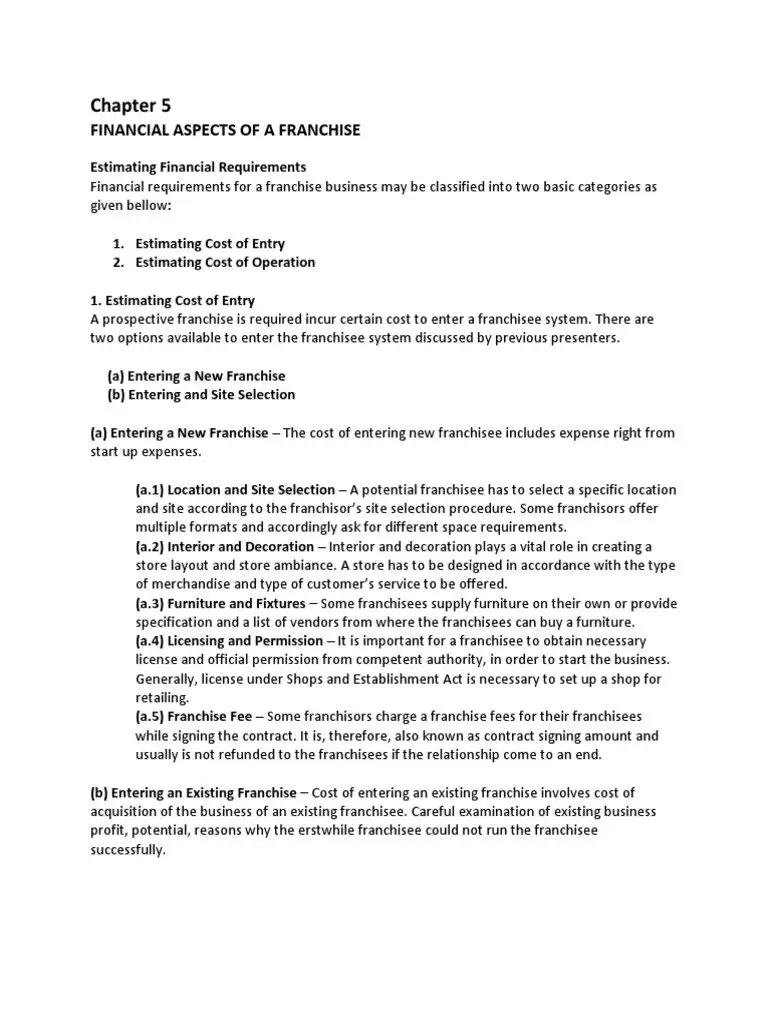Franchising is a business model that offers entrepreneurs the opportunity to operate a proven and successful business by leveraging an existing brand. It allows individuals to start their own business while benefiting from the support and expertise of an established company. When discussing franchising, it is essential to understand its financial aspects, such as the initial investment required, ongoing royalties, and potential profitability. In this blog article, we will explore what franchising is and delve into its financial implications, providing you with valuable insights to help you make informed decisions on entering the world of franchising. So, let’s dive right in!
What is Franchising and Its Financial Aspects
Franchising is a business model that has gained immense popularity in recent years. It offers entrepreneurs a unique opportunity to own a business while benefiting from the established brand recognition and support of a larger, successful company. In this article, we will delve into the concept of franchising and explore its financial aspects in detail.
The Basics of Franchising
Franchising refers to a legal and commercial relationship between the owner of a brand, known as the franchisor, and an individual or company, known as the franchisee, who is granted the right to operate a business under the franchisor’s established brand. The franchisee pays fees and royalties to the franchisor in exchange for the use of the brand, access to proven business systems, training, ongoing support, and the right to sell the franchisor’s products or services.
Franchising has become a popular option for individuals who aspire to become business owners but prefer the guidance and support that comes with an established brand. It allows entrepreneurs to start a business with a proven concept, established customer base, and a recognized brand name, reducing the risks associated with starting a new business from scratch.
The Financial Investment
Investing in a franchise requires a significant financial commitment. The initial investment typically includes the franchise fee, which grants the franchisee the right to operate under the franchisor’s brand, as well as expenses related to setting up the business, such as leasehold improvements, equipment, and inventory. The initial investment can vary widely depending on the industry, brand, and location, ranging from a few thousand dollars to millions.
In addition to the initial investment, franchisees are usually required to pay ongoing fees and royalties to the franchisor. These fees typically include a royalty fee, which is a percentage of the franchisee’s gross sales, and a marketing or advertising fee, which contributes to the overall brand promotion efforts. These fees are often paid on a regular basis, such as monthly or quarterly, and are essential for the continuous support and marketing provided by the franchisor.
Franchise Financing Options
Given the substantial financial investment required, many aspiring franchisees seek various financing options to fund their franchise purchase. Here are some common methods of franchise financing:
- Personal Savings: Many franchisees use their personal savings to cover the initial investment. This allows them to avoid debt and maintain control over their business.
- Bank Loans: Franchisees can apply for traditional bank loans to finance their business. Banks usually require a solid business plan, collateral, and a good credit history to approve the loan.
- Small Business Administration (SBA) Loans: The SBA offers loan programs specifically designed to assist entrepreneurs in starting or expanding a franchise business. These loans often have lower interest rates and longer repayment terms.
- Investors or Partnerships: Some franchisees seek investors or enter into partnerships to share the financial burden. This option allows for additional capital infusion and can provide valuable expertise.
- Franchisor Financing: In certain cases, franchisors may offer financing options to prospective franchisees. This can include direct loans, delayed payments on the initial franchise fee, or equipment leasing programs.
It is important for potential franchisees to explore all available financing options and choose the one that best suits their financial situation and goals. Conducting thorough research, consulting with financial advisors, and carefully analyzing the franchise’s financial projections can help make an informed decision.
Financial Performance and Profitability
While franchising offers an established business model, success and profitability are not guaranteed. The financial performance of a franchise business depends on various factors, including the industry, market conditions, location, management skills, and the effectiveness of the franchisor’s support.
Before investing in a franchise, it is crucial to review the franchisor’s financial statements, including their audited financials, to assess the financial health and stability of the company. Additionally, analyzing the franchise’s Item 19 disclosure in the Franchise Disclosure Document (FDD) provides valuable insights into the financial performance of existing franchisees. This disclosure outlines the historical financial data, including sales, costs, and profitability.
Prospective franchisees should also consider other key financial factors:
- Break-even Point: Determining the break-even point is vital to understand how long it will take to cover the initial investment and start generating profits. Factors such as fixed costs, variable costs, and pricing strategy impact the break-even analysis.
- Return on Investment (ROI): Calculating the potential ROI helps measure the profitability of the franchise business. Understanding the timeline for recouping the initial investment and generating positive cash flow is crucial in evaluating the financial viability.
- Operating Expenses: Analyzing the ongoing operating expenses, such as royalties, rent, utilities, marketing fees, and employee wages, is crucial to assess the financial feasibility of the franchise.
- Growth Potential: Evaluating the growth potential of the franchise system is essential for long-term financial success. Factors such as the franchisor’s expansion plans, market demand, and competition play a significant role in determining the franchise’s future profitability.
It is advisable to consult with financial professionals and existing franchisees to gain a comprehensive understanding of the financial aspects and potential returns associated with a specific franchise opportunity.
Managing Financial Aspects as a Franchisee
Once a franchise business is up and running, effective financial management becomes crucial for long-term success. Here are some key financial considerations for franchisees:
- Budgeting and Cash Flow: Developing a detailed budget and cash flow management plan is essential to monitor and control expenses, ensure timely payments, and maintain sufficient working capital.
- Accounting and Bookkeeping: Implementing an efficient accounting and bookkeeping system helps track income, expenses, and profitability accurately. It also streamlines tax compliance and facilitates financial reporting.
- Inventory Management: Proper inventory management is crucial to prevent excess stock or shortages, optimize cash flow, and minimize carrying costs. A well-implemented inventory control system ensures efficient operations and customer satisfaction.
- Cost Analysis: Regularly analyzing costs, including supplier pricing, utility expenses, labor costs, and marketing expenditures, can help identify areas for cost optimization and improve profitability.
- Profit Reinvestment: Allocating a portion of the profits for reinvestment in the business, such as marketing initiatives, technology upgrades, or employee training, fosters growth and sustainability.
- Financial Reporting: Generating regular financial reports, such as profit and loss statements, balance sheets, and cash flow statements, provides valuable insights into the financial performance and helps in making informed business decisions.
By actively managing these financial aspects, franchisees can enhance profitability, make informed business decisions, and ensure the long-term success of their franchise.
In conclusion, franchising offers aspiring entrepreneurs an attractive opportunity to own a business while leveraging the established brand and support of a franchisor. Understanding the financial aspects of franchising, including the initial investment, financing options, financial performance, and managing finances as a franchisee, is crucial for making informed decisions and achieving long-term success. Conducting thorough research, consulting with professionals, and carefully analyzing the financials can help navigate the complex world of franchising and build a prosperous franchise business.
Financial Aspects of Buying a Franchise
Frequently Asked Questions
Frequently Asked Questions (FAQs)
What is franchising and how does it work?
Franchising is a business model where an individual or company (franchisee) purchases the rights to operate a business using a established brand and proven business system from the franchisor. The franchisee pays fees and royalties to the franchisor in exchange for ongoing support and the use of the brand.
What are the financial aspects involved in franchising?
Franchising involves various financial aspects that potential franchisees should consider:
– Initial Franchise Fee: This is the upfront fee paid to the franchisor to secure the rights to operate under their brand.
– Royalty Fees: These are ongoing fees paid to the franchisor based on a percentage of the franchisee’s sales. It is usually paid monthly or quarterly.
– Advertising and Marketing Fees: Franchisees often contribute to a shared fund for marketing and advertising efforts to promote the brand.
– Start-up Costs: Franchisees need to consider other expenses such as equipment, inventory, lease or purchase of the premises, and initial marketing efforts.
How do franchisors support franchisees financially?
Franchisors provide various forms of financial support to franchisees:
– Financing Options: Some franchisors offer assistance in securing financing, either through partnerships with financial institutions or by providing direct loans.
– Bulk Purchasing Power: Franchise systems often negotiate pricing discounts with suppliers due to the collective purchasing power of all their franchisees, ensuring cost savings for individual franchisees.
– Business Development Support: Franchisors may offer guidance and support in developing a business plan, financial projections, and accessing financial resources like grants or government programs.
Is franchising more expensive than starting an independent business?
The cost of franchising can be higher initially due to the franchise fee and ongoing royalties. However, franchising offers several advantages that can outweigh the higher costs, including a proven business model, brand recognition, training and support, and collective marketing efforts. Independent businesses often require more effort and resources to establish a brand and develop successful systems from scratch.
Can I obtain financing from a bank to start a franchise?
Yes, many banks offer small business loans specifically for franchise investments. Franchises have a higher rate of success compared to independent businesses, making them more attractive to lenders. It is essential to have a solid business plan, financial projections, and a good credit score to increase the chances of obtaining financing.
Can I negotiate the terms of a franchise agreement?
Franchise agreements are usually standardized by the franchisor to maintain consistency across all franchisees. While some aspects may be negotiable, such as the territory and the lease terms, the core elements of the agreement, including fees, royalties, and operational guidelines, are typically non-negotiable. It is important to carefully review the agreement and seek legal advice before signing.
What are the risks associated with franchising?
Franchising, like any business venture, carries certain risks. Some potential risks include:
– Initial Investment: Franchisees may face high upfront costs, which can be a financial risk if the business does not perform as expected.
– Operational Control: Franchisees must operate within the guidelines set by the franchisor, limiting individual decision-making and creativity.
– Brand Reputation: The reputation of the franchise brand can be impacted by the actions of other franchisees, affecting the success of individual locations.
– Renewal and Termination: Franchise agreements have expiration dates and can be terminated if the franchisee fails to comply with the terms, causing potential loss of investment.
How can I determine if franchising is the right choice for me?
Consider the following factors when deciding if franchising is suitable for you:
– Experience and Skills: Assess your experience, skills, and interest in the industry you wish to enter. Franchising often requires adherence to established systems and operating procedures.
– Financial Readiness: Evaluate your financial situation and determine if you have the necessary funds for the initial investment, ongoing fees, and working capital requirements.
– Support and Training: Research the level of support and training provided by the franchisor to ensure it aligns with your needs and expectations.
– Long-term Goals: Consider your long-term goals and how franchising fits into your overall business and personal objectives.
Final Thoughts
In conclusion, franchising refers to a business model in which a franchisor grants the rights to a franchisee to operate a business using their established brand and proven system. It offers various financial benefits, such as lower start-up costs compared to starting an independent business and access to ongoing support and training. Franchisees also benefit from the existing brand recognition, marketing strategies, and economies of scale. However, it is essential for potential franchisees to thoroughly evaluate the financial aspects, including initial investment, royalty fees, and potential profitability. Understanding these financial aspects is crucial for making informed decisions about entering the world of franchising.



